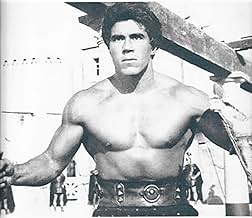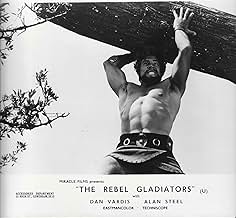Ajouter une intrigue dans votre langueIn order to persuade the Emperor to spare his village, the mighty Ursus is forced to fight the greatest gladiator in Rome in the Roman Arena.In order to persuade the Emperor to spare his village, the mighty Ursus is forced to fight the greatest gladiator in Rome in the Roman Arena.In order to persuade the Emperor to spare his village, the mighty Ursus is forced to fight the greatest gladiator in Rome in the Roman Arena.
- Réalisation
- Scénario
- Casting principal
José Greci
- Arminia
- (as Josè Greci)
Artemio Antonini
- Gladiator
- (non crédité)
Bruno Ariè
- Gladiator
- (non crédité)
Sal Borgese
- Gladiator
- (non crédité)
Valéry Inkijinoff
- Torturer
- (non crédité)
Avis à la une
One of countless Italian gladiator movies, this one covers some of the ground that made up the more recent success "Gladiator" starring Russell Crowe, though most of the elements of the story differ to some degree. Ciani plays a strong, tough, spoiled soldier who stands to inherit the crown of Rome as his father the emperor has died. His endless terrorizing and pillaging is threatened only by Vadis, a former Roman soldier who is now a Christian who expounds the virtues of non-violence. When Vadis offends Ciani by refusing to kill him upon capture, he in turn kidnaps Vadis's girlfriend, holding her hostage in order to force Vadis to fight in the arena. The two square off in a first encounter and later in an extended and well done bout. A later battle sequence contains a massive assembly of extras and the destruction of a bridge (this being handled primarily in close-up.) Though Ciani (who looks like a pumped up James Brolin) only holds a limited amount of acting skill, he is Olivier compared to Vadis who resembles a happy monkey half the time, smiling inappropriately or staring blankly and failing to bring any significant dramatic weight to his role. The female cast here is utilized a little better than in some gladiator movies. As is usually the case, the film has large amounts of sword-clanking, battle, exotic women and badly dubbed voices. However, this one appears to have had a sizable budget with some impressive sets. It also contains some reasonably good directorial touches and camera-work, not always strong points for this genre. It might even be a little more impressive if a better print were in circulation, but that isn't the case at present. Even so, despite his impressive physique, Vadis is not one of the better leading men of this realm.
I'd like to correct an error made by a previous reviewer, who tells us, "I was unable to keep a straight face most of the time especially with Alan Steel...playing a very athletic Commodus rather than the mad wimp which history tells us he was!"
In fact, the historian Herodian tells us that Commodus "was the handsomest man of his time, both in beauty of features and in physical development...inferior to no man in skill and in marksmanship." It is Hollywood, not history, that insists on making Roman emperors into effete wimps. For historical accuracy, Russell Crowe would have been better cast to play Commodus than wimpy Joaquin Phoenix. But Hollywood will insist on making the worldly villain "less manly" than the straight-arrow hero.
Another reviewer here berates the performance of Dan Vadis as the hero in this movie, saying he "resembles a happy monkey half the time, smiling inappropriately or staring blankly..." But remember that Vadis is playing a slap-happy Christian, and doesn't that description fit a lot of the Christians you know?
Alan Steel's muscular and brutish portrayal of Commodus is probably the cinema's most accurate, even though this movie, no less than "Gladiator" and "Fall of the Roman Empire," pulls its punches when it comes to Commodus. The truly shocking, hair-raising accounts of his reign (found in Dio Cassius, Herodian, and the Historia Augusta) go far beyond anything Hollywood or Cinecitta have ever dared to put on the screen!
In fact, the historian Herodian tells us that Commodus "was the handsomest man of his time, both in beauty of features and in physical development...inferior to no man in skill and in marksmanship." It is Hollywood, not history, that insists on making Roman emperors into effete wimps. For historical accuracy, Russell Crowe would have been better cast to play Commodus than wimpy Joaquin Phoenix. But Hollywood will insist on making the worldly villain "less manly" than the straight-arrow hero.
Another reviewer here berates the performance of Dan Vadis as the hero in this movie, saying he "resembles a happy monkey half the time, smiling inappropriately or staring blankly..." But remember that Vadis is playing a slap-happy Christian, and doesn't that description fit a lot of the Christians you know?
Alan Steel's muscular and brutish portrayal of Commodus is probably the cinema's most accurate, even though this movie, no less than "Gladiator" and "Fall of the Roman Empire," pulls its punches when it comes to Commodus. The truly shocking, hair-raising accounts of his reign (found in Dio Cassius, Herodian, and the Historia Augusta) go far beyond anything Hollywood or Cinecitta have ever dared to put on the screen!
Was this film an influence on Ridley Scott's Gladiator? Who can tell.
Set at the same time as the awarding winning film this is the story of Commodus, son of Marcus Aurelius, who takes power when his father dies. Unable to find anyone to match him in the arena he runs rampant over the empire killing and pillaging as he goes. The only man who can stop him is Ursus, who is tricked in to becoming a gladiator so that he might be able to kill the mad Commodus.
This is a well made spectacle with lots of action and a pacing that never really flags.
If you get the chance to see it, there are worse ways to spend a rainy afternoon.
Set at the same time as the awarding winning film this is the story of Commodus, son of Marcus Aurelius, who takes power when his father dies. Unable to find anyone to match him in the arena he runs rampant over the empire killing and pillaging as he goes. The only man who can stop him is Ursus, who is tricked in to becoming a gladiator so that he might be able to kill the mad Commodus.
This is a well made spectacle with lots of action and a pacing that never really flags.
If you get the chance to see it, there are worse ways to spend a rainy afternoon.
Until fairly recently, I hadn't heard of director Domenico Paolella and the only films of his I'd seen prior to this one were two good Italian comedies featuring legendary Italian comic, Toto'; one of them, IL CORAGGIO (1955), was a revamping of Jean Renoir's BOUDU SAVED FROM DROWNING (1932), tailored to suit the star's unique brand of mimicry! As it happens, this muscleman epic is quite another thing, with the mythical giant Ursus who was made famous by Buddy Baer in the MGM super production of QUO VADIS (1951) and played here by the aptly (and hilariously) named Dan Vadis! somehow incongruously inserted into another retelling of the events which were much better, and more spectacularly, handled in Anthon Mann's THE FALL OF THE ROMAN EMPIRE (1964) and Ridley Scott's GLADIATOR (2000). Unfortunately, I was unable to keep a straight face most of the time especially with Alan Steel (another muscleman who featured heavily in such fare) playing a very athletic Commodus rather than the mad wimp which history tells us he was!
I remember when this movie was first shown on a Buffalo N'Y. TV station.
They advertised it all week on their channel with clips of Dan Vadis throwing the logs at the Roman Soldiers. There was also a small ad in the TV Guide of Dan throwing the log. There was also TV Clips if the watch tower being toppled over. I always liked the part where Alan Steel tries to pick up his sword and Dan Vadis says "Better leave it with us as you don't know how to use it anyway". I have used that line myself in arguments and also added, "besides, you might hurt yourself". The Emperor Commodus, wanting to fight in the arena as a Gladiator. Was the basis of the 2000, Russel Crowe movie, GLADIATOR. Almost the exact same story and they didn't even give credit to this movie, even though the storyline is so obviously the same. I never liked the Bridge scene were Dan Vadis holds off the Roman Calvary. Look at the background and you can see that is was shot in a studio with a blank wall behind the bridge. They also used "footage" from the movie Constantine and the Cross instead of re-filming new scenes. Watch the entire movie and see a really good example of a great Sword & Sandal movie from 1961. Alan Steel started out as Steve Reeves' stunt double and Dan Vadis had just arrived in Italy when this movie was made. Karate Dan Vadis, as he was known, was living in Gordon Mitchell's apartment when he first arrived in Italy.
Larry Anderson.
They advertised it all week on their channel with clips of Dan Vadis throwing the logs at the Roman Soldiers. There was also a small ad in the TV Guide of Dan throwing the log. There was also TV Clips if the watch tower being toppled over. I always liked the part where Alan Steel tries to pick up his sword and Dan Vadis says "Better leave it with us as you don't know how to use it anyway". I have used that line myself in arguments and also added, "besides, you might hurt yourself". The Emperor Commodus, wanting to fight in the arena as a Gladiator. Was the basis of the 2000, Russel Crowe movie, GLADIATOR. Almost the exact same story and they didn't even give credit to this movie, even though the storyline is so obviously the same. I never liked the Bridge scene were Dan Vadis holds off the Roman Calvary. Look at the background and you can see that is was shot in a studio with a blank wall behind the bridge. They also used "footage" from the movie Constantine and the Cross instead of re-filming new scenes. Watch the entire movie and see a really good example of a great Sword & Sandal movie from 1961. Alan Steel started out as Steve Reeves' stunt double and Dan Vadis had just arrived in Italy when this movie was made. Karate Dan Vadis, as he was known, was living in Gordon Mitchell's apartment when he first arrived in Italy.
Larry Anderson.
Le saviez-vous
- AnecdotesOf all the onscreen portrayals of Commodus, Sergio Ciani's is probably the closest to the real emperor. The real Commodus was athletic and muscular. In reality, Commodus, as in the film, did enjoy performing as a gladiator. He was also said to have been a skilled swordsman and marksman.
- GaffesCommodus is referred to in the movie as Marcus Commodus. Never in his life did he ever have that name, nor was he ever known by that name.
Meilleurs choix
Connectez-vous pour évaluer et suivre la liste de favoris afin de recevoir des recommandations personnalisées
Détails
- Date de sortie
- Pays d’origine
- Langue
- Aussi connu sous le nom de
- Rebel Gladiators
- Lieux de tournage
- Incir De Paolis Studios, Rome, Lazio, Italie(as In.Ci.R. De Paolis)
- Société de production
- Voir plus de crédits d'entreprise sur IMDbPro
- Durée1 heure 35 minutes
- Mixage
- Rapport de forme
- 2.35 : 1
Contribuer à cette page
Suggérer une modification ou ajouter du contenu manquant


























